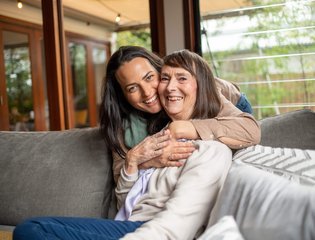Talking To Your Family
When is the right time to tell your children about genetic faults?
You can choose to tell your children when they are young or wait until they are older. There are benefits to both:
- You can delay telling your children until you feel they are old enough. The benefit of this is that it doesn't cause them any distress at an age when you may feel it is too much for them to handle or understand.
- You can tell them at a young age. The benefit of this is that they have time to come to terms with their possible risk and you can start having discussions early on about some of the difficult decisions they may have to make.
There is no right or wrong time to tell your children. You’ll want to talk through this with someone close to you, and with your genetics team, to help you to decide which would be the best option for your family.
Given that the cancers attributed to the BRCA1 and BRCA2 gene faults don’t usually arise until people are in their 30s (or later), the testing of young children is not often available, as action can’t be taken until they are over 18.
It is also generally better if children can be involved in discussions about their own genetic testing, and this is not possible for very young children. Teenagers may benefit from a discussion with a genetics team, even if testing is not carried out until they are 18.
Telling your extended family
Your genetics team will help you identify which of your extended family may also have inherited the mutation. This will depend on what side of the family – your father’s or mother’s – the gene fault was passed down from.
Once this is established, your brothers, sisters, aunts, uncles and cousins on that side of the family will be known to be at risk of having inherited the mutation.
While it is recommended that they are informed, there are currently no official procedures to assist with this and the responsibility and decision to tell them lies with you.
If you don’t feel comfortable having this discussion with your family members, your genetics clinic may be able to give you information to pass on.
This will explain that a family member has an inherited genetic mutation and will describe what this might mean to them and how they can obtain a referral to their nearest genetics clinic for genetic counselling and testing.
If you or your family members have any questions contact info@ovarian.org.uk.


